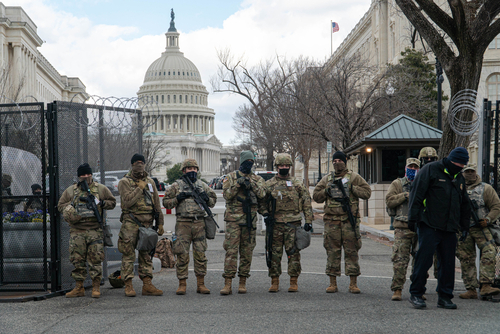After a congressional intern was tragically killed in D.C., a grieving mother’s call for tougher juvenile crime laws has ignited a heated national debate—while President Trump’s forceful response sparks fierce battles over federal authority and local control.
Mother’s Tragedy and Demand for Action Shake the Nation
On June 30, 2025, the fatal shooting of Eric Tarpinian-Jachym, a 21-year-old congressional intern, thrust Washington, D.C.’s juvenile crime crisis into the national spotlight. Eric’s mother, Tamara Jachym, has become the voice for countless families frustrated by what they see as the D.C. Council’s leniency towards violent youth offenders. Jachym’s public criticism of local leaders was direct: she accused the D.C. Council of prioritizing “woke” rehabilitation policies over community safety, insisting, “If the law had been tougher, my son would still be alive.” Her stance resonated with citizens demanding accountability from elected officials who, in their eyes, have failed to protect law-abiding families.
In the days following the tragedy, public anger surged as details emerged about the suspect’s juvenile status and previous encounters with law enforcement. The D.C. Council responded by enacting the Juvenile Curfew Emergency Amendment Act on July 7, 2025, extending curfew hours and including 17-year-olds. Yet Jachym and many supporters dismissed this as “too little, too late,” arguing that incremental reforms could not keep pace with rising violence. The debate quickly escalated from local frustration to a national flashpoint, reflecting widespread concerns over the erosion of public safety, especially in cities seen as embracing soft-on-crime policies.
Trump’s Federal Intervention: A Bold Move to Restore Order
President Trump’s swift and decisive action marked a turning point. On August 11, 2025, the administration placed the Metropolitan Police Department under direct federal control and activated the National Guard to restore order. Trump described D.C.’s approach to juvenile crime as “absurd,” vowing to prosecute violent offenders as adults starting at age 14 and ending what he called “dangerous experiments” with leniency. U.S. Attorney Jeanine Pirro was tapped to lead a new juvenile justice task force, promising real consequences for youth offenders and a renewed focus on the rights of victims and law-abiding citizens.
This rare intervention highlights the unique status of Washington, D.C., where the federal government holds ultimate authority but typically defers to local governance. Supporters praised Trump for cutting through bureaucratic red tape and responding to what they see as a crisis ignored by progressive lawmakers. For conservatives, the president’s actions signal a return to common sense: putting public safety and family values above political correctness and failed social experiments.
Local Pushback and Legal Showdown Over Home Rule
The federal takeover immediately sparked fierce backlash from D.C. officials and national Democratic leaders. D.C. Attorney General Brian Schwalb and Congressional Democrats denounced the move as a violation of local autonomy and home rule, launching lawsuits to block federal control. The D.C. Council defended its recent reforms, pointing to the Secure DC Omnibus Amendment Act and citing research suggesting that harsher penalties for juveniles may not always reduce crime. They warned that sweeping crackdowns risk over-criminalizing youth and undermining rehabilitation—a position that has drawn skepticism from families affected by violent crime.
The legal and political battle lines are now drawn. With federal control of policing in effect, but facing court challenges and public protests, the outcome remains uncertain. The situation exposes a widening gulf between those demanding swift justice and those advocating for measured reform, with the safety of ordinary citizens hanging in the balance.
Broader Implications: Public Safety, Federalism, and Conservative Values
The aftermath of Eric Tarpinian-Jachym’s death reaches far beyond one tragic incident. In the short term, D.C. residents face stricter curfews, increased policing, and a visible federal presence on city streets. Victims’ families feel heard for the first time in years, while critics decry what they call government overreach. The long-term stakes are even higher: this case may set a precedent for future federal interventions in local governance and reshape the national debate on juvenile justice.
Mom of Slain Intern: Trump Taking Loss More Seriously Than D.C. Officials https://t.co/OK0Ws3oqEP via @BreitbartNews
— Shuttrbg7 (@Shuttrbg2308) August 18, 2025
For conservative Americans, the events in D.C. confirm deep anxieties about the consequences of “woke” policies, unchecked crime, and the erosion of constitutional values. The Trump administration’s response signals a renewed commitment to order, individual rights, and the principle that government’s first duty is to protect its citizens. As the debate rages on, families across the nation are watching closely—demanding leaders who will stand up for public safety, uphold the rule of law, and defend the American way of life.
Sources:
Mayor Bowser Announces Emergency Legislation to Amend District’s Juvenile Curfew Laws
Juvenile Curfew Emergency Amendment Act of 2025
Trump: No-cash bail is a ‘disaster,’ vows crackdown on youth crime in D.C.
Council Advances Key Public Safety Measures, Including Temporary Expanded Youth Curfew
Click this link for the original source of this article.
Author: Editorial Team
This content is courtesy of, and owned and copyrighted by, https://ourpatriot.com and its author. This content is made available by use of the public RSS feed offered by the host site and is used for educational purposes only. If you are the author or represent the host site and would like this content removed now and in the future, please contact USSANews.com using the email address in the Contact page found in the website menu.








